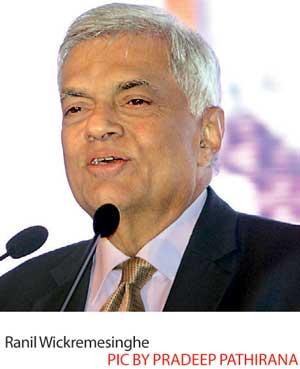21 Mar 2019 - {{hitsCtrl.values.hits}}
 By Nishel Fernando
By Nishel Fernando
The government will collaboratively work with the banking sector to bring down the high market interest rates in the country, to boost private investment in order to support economic growth, Prime Minister Ranil Wickremesinghe said.
“We have to talk to both state and private commercial banks as to how their lending rates would come down. This is essential for the private sector to get ahead. However, the continuation of fiscal consolidation has to go on,” Wickremesinghe said.
He was addressing Fireside Chat 2019, co-organised by the International Chamber of Commerce of Sri Lanka, CIMA Sri Lanka and the Daily FT newspaper, on Tuesday,
in Colombo.
The premier noted that the high interest rates are one of the reasons for low economic growth the country is experiencing at the moment.
“Sri Lanka’s real interest rates are currently the highest in the region. There is a substantial difference between the market rates and Central Bank lending rates. These are some of the impediments to reasonable economic growth,” he said. He said the Central Bank would take measures to reduce the high interest rates, without any changes to the policy rates, with potential further reduction in the Statutory Reserve Ratio (SRR) and releasing margin deposits to the banking system.
The Central Bank has already taken measures to address the liquidity deficit in the rupee market with two SRR rate cuts last year and this year.
“The liquidity shortage itself has been reduced from Rs.94 billion in November last year to Rs.12 billion at present. This has resulted in Rs.150 billion coming into the market,” Wickremesinghe said.
The government is planning to pump over Rs.300 billion into the economy in coming months through development programmes such as Gamperaliya and Enterprise Sri Lanka.
Wickremesinghe said the government has settled a significant amount of outstanding treasury bills, pointing out that only Rs.30 billion remain to be settled for last year, compared to R.136 billion when the government came into power in 2015.
“There were Rs.136 billion outstanding bills when we came to power and we settled all of that. We also settled the outstanding bills in 2016 and 2017. In 2018, we settled Rs.60 billion of total outstanding Rs.90 billion,” he said.
EPF to return to bourse with new security system
Which could definitely be a welcome message, Prime Minister Ranil Wickremesinghe this week said the state-run private sector pension fund, the Employees’ Provident Fund (EPF), would re-enter the Colombo bourse soon.
“We are looking at the EPF entering the share market. We need to put a new security system in place and the Central Bank Governor has briefed me it has progressed very well,”
Wickremesinghe said.
He noted that the EPF’s return would certainly help to raise the sentiment in the market.
Since 2015, the EPF had refrained from making new investments in the Colombo Stock Exchange (CSE), as the fund failed to garner any returns on the investment it made in the CSE.
On top of that, the alleged involvement of the EPF in the infamous treasury bond scandal made the Central Bank to suspend the fund’s all secondary market activities.
According to the 2016 annual report of the EPF, the fund incurred a combined loss of Rs.8449 million in 2015 and 2016 from its investments in the CSE.
The fund, with a membership of 2.6 million at end-2017, had grown to a value of Rs.2,060 billion.
15 Nov 2024 47 minute ago
15 Nov 2024 2 hours ago
15 Nov 2024 3 hours ago
15 Nov 2024 3 hours ago
15 Nov 2024 3 hours ago